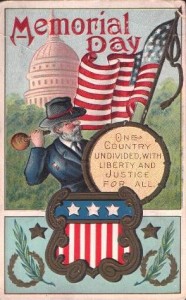Memorial Day: Learning From History
“One of the first [observances of Civil War dead] occurred in Columbus, Miss., April 25, 1866, when a group of women visited a cemetery to decorate the graves of Confederate soldiers who had fallen in battle at Shiloh. Nearby were the graves of Union soldiers, neglected because they were the enemy. Disturbed at the sight of the bare graves, the women placed some of their flowers on those graves, as well.”
—“Memorial Day History”
Department of Veterans Affairs
 On 5 May 1868, Maj. Gen. John A. Logan declared that “The 30th of May, 1868, is designated for the purpose of strewing with flowers, or otherwise decorating the graves of comrades who died in defense of their country during the late rebellion…” On May 30, the first Decoration Day was held. Graves of the war dead from both the north and south were equally honored. After the Great War, Decoration Day became Memorial Day; a time to remember all American service personnel who died in war.
On 5 May 1868, Maj. Gen. John A. Logan declared that “The 30th of May, 1868, is designated for the purpose of strewing with flowers, or otherwise decorating the graves of comrades who died in defense of their country during the late rebellion…” On May 30, the first Decoration Day was held. Graves of the war dead from both the north and south were equally honored. After the Great War, Decoration Day became Memorial Day; a time to remember all American service personnel who died in war.
My grandfather Ferdinand Berg survived his service in the Great War but died on 22 January 1942 of Carcinoma (bronchogenic) of the right lung with generalized metastases. Our family believes the cancer was partially the result of his being gassed during his time in the service. A high funeral mass was sung by three priests: Fr. S. A. Van Gessel, Fr. A. P. Hafner, and Fr. William Walsh. Full military honors were presented by the Stamnitz-Lindeman Legion from Sebewaing, Michigan.
Remembering Ferdinand and his service seems an appropriate way to celebrate Memorial Day. But it is not so obvious that his cousin Josef “Saginaw Joe” Berg should be equally remembered. Like his cousin, Josef survived his service in the Great War. However, after Josef died on 4 January 1989 in Punta Gorda, Florida, he was buried without full military honors.
The difference between cousins Ferdinand and Josef was that one served his country in the American armed services and the other served his country in the German army. It is a sobering thought to realize that these two young men could have met each other on the battlefield where one could have killed the other.
Taking our cue from the women of Columbus, Mississippi, it is appropriate that both Ferdinand and Josef should be remembered today. Furthermore, while we remember the sacrifices of those who have fought to preserve our liberty, we can also remember the humanity of our enemies—some of whom we call Cousin Josef.
- –Steven L. Berg, PhD
Reblogged this on Push Dump Fat Button.